The Golden Crescent of South Asia – a region comprising Afghanistan, Iran and Pakistan – is a principal site for the production and distribution of opium and heroin. Over the past few decades, war, terrorism and a shifting political landscape have facilitated an active heroin trade throughout the region.
There are three well-defined heroin trafficking routes that originate in the Golden Crescent region. The Balkan route operates through Iran and Turkey and traffics the bulk of Afghan heroin to Europe. The northern route supplies heroin to the Russian Federation and Central Asia. Due to increased law enforcement along these two routes, alternate routes have emerged, collectively called the southern route, which traffics heroin to Iran and Pakistan, and from these countries, via sea and air, to other parts of the world.
Pakistan’s geographic location next to Afghanistan, the world’s largest producer of opium, places the country in a veritable front-row position in terms of drug trafficking. Its establishment has left no stone unturned in exploiting this geographic location to its own advantage. The money generated from the drug trade has been used to fund proxy terror groups. The role of narcotics in funding terror activities by Pakistan was revealed by Lashkar-e-Taiba (LeT) terrorist David Coleman Headley, one of the main accused in the 26/11 Mumbai attacks. During his interrogation in 2010, he revealed the role played by Pakistan’s spy agency, the Inter-Services Intelligence (ISI), in linking drug lords and terrorists and facilitating the transportation of weapons, along with drugs, to India.
While poppy cultivation has largely been eliminated in Pakistan, the crop is still grown in large parts of southern provinces of Afghanistan like Kandahar and Helmand, where the Taliban has a strong influence. Analysts say opium poppies and heroin are among the main sources of income for the Taliban, which controls 80 percent of the drug production area in Afghanistan. The problem for them is how to transport these drugs to other countries. Here, Pakistan acts as a facilitator. The drug consignments, in connivance with Pakistan’s authorities, are smuggled through the Pakistan-Afghanistan border. From there, these consignments head for Pakistan’s air and seaports and, hence, to further destinations in China, Southeast Asia, Africa and Europe.
As United Nations World Drug Report 2012 reported, “Pakistan provides a vital transit route for smuggling of drugs worth $30 billion from neighboring Afghanistan.” Though not a major reason, Pakistan backs restoration of Taliban rule in Afghanistan because if the group returns to power, all these drug cartels could be resuscitated and its major benefactor Pakistan will have even more funds with which to sponsor its proxy terror groups.
Pakistan’s role in drug proliferation is validated by a number of arrests of its nationals in other countries on charges of drug trafficking. Shahbaz Khan, a Pakistani national, was the leader of a drug trafficking organization (the “DTO”) based in Afghanistan and Pakistan, which produced and distributed massive quantities of narcotics around the world. He was arrested by Liberian authorities in December 2016 and later deported to the United States, where in 2019 he was sentenced to 15 years for conspiring and attempting to import heroin into the U.S. In May 2017, officials for the U.K.’s Border Force impounded a Pakistan International Airlines (PIA) flight from Islamabad at London’s Heathrow airport. Later, the National Crime Agency said that a quantity of heroin had been found hidden in different panels of the plane. In March 2018, two members of the cabin crew of a PIA flight, traveling on an Islamabad-Paris flight (PK-749), were caught smuggling narcotics on board the flight.
Of late, speculations abound that PIA has come under the scanner of Qatar authorities who have recently discovered narcotics smuggling modules by Pakistani nationals who arrive in Doha, taking advantage of the country’s Visa on Arrival (VoA) facility. Some suggest that Qatari officials have photographic and video evidence of arrested drug smugglers from Pakistan. If these speculations turn out to be true, then it is quite possible Qatar could suspend the VoA facility for Pakistan’s nationals if it does not take action to prevent the smuggling of narcotics into Qatar.
The issue of narcotics smuggling has the potential to derail Pakistan’s bilateral relations and besmirch its international reputation. Indeed, the question arises as to why Pakistan would jeopardize its relations with other countries in order to benefit from narcotics. The answer is that the money derived from drug smuggling serves Pakistan’s larger agenda of sponsoring proxy terror groups. With the plenary session of the intergovernmental Financial Action Task Force (FATF) scheduled for later this month, Pakistan’s role in funding terror organizations through drugs/narcotics smuggling is sure to come up for discussion, as the FATF determines the country’s listing. If Pakistan does not want to be blacklisted, it must take action to stop drug proliferation. Blacklisting by FATF could spell ruin for Pakistan’s already dwindling economy.
Habiba Ashna Marhoon is the founder of AWiD (Afghan Women in Dialogue) and an activist who works around the Afghan Peace Negotiations (APN) topic.

































